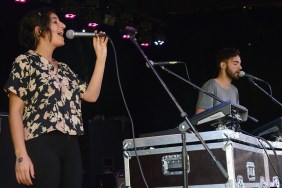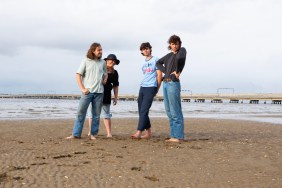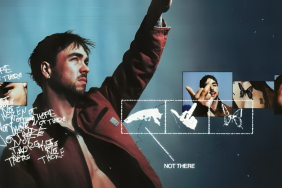Like Sidney Samson to the Dutch and Yolanda Be Cool to Australia, Marko Miličević – aka Gramophonedzie – is Serbia’s offering to the upper-echelon of DJ’s who have broken into the commercial realm of music. Pronounced ‘Milichevich’, he speaks with an air of knowledge – years of experience in sound that far surpasses his reputation as a ‘one-hit wonder’. The success of Why Don’t You enables Gramophonedzie to travel the world, showcasing his musical style that is far removed from any David Guetta archetypes – although he’s not afraid to drop a ‘crowd pleaser’ if the mood strikes (“I like to make people happy and I like to make people dance.”) Such is the modesty of Marko.
MF: What have you been up to lately? What’s been keeping you busy?
Marko: Well, I was travelling a lot during the whole summer in Europe, and it was really busy. I was playing almost everyday – different country, different gig.
MF: It must be exhausting. Will you be taking a break soon?
M: For now it’s constant travel; today for example I’ll fly out to Brazil, then after that will be coming to Australia, then after that Asia; then I think I will take a little break and stay in the studio and prepare my album.
MF: Sounds like a well-deserved break…
M: It is hard, but I see it as a great opportunity to play everywhere I really adore. It’s a dream come true…it’s good.
MF: How does it feel travelling the world and accomplishing all these things?
M: Well… good? (Laughs). It feels good in a way, but only the travelling is hard. Everything else is really great. I mean, I can travel 20 hours and I’m really, really tired, but also, as soon as I stand in front of the decks, I get a new energy. I feel wherever I go, it’s a new place, new people; you know, new adventure…yeah!
MF: So much optimism (both laugh).
M: Yeah, it’s good.
MF: As far as touring, being the DJ, filling that role – you’re also a producer. What came first?
M: Well, I’ve DJ’ed for the last fifteen years. I started when I was twelve or something like that. The producing came later – I was always really into producing, but as I was living in Serbia – I don’t know whether people are familiar or not, but we’re not a super rich country, so it was pretty hard to get equipment and get anything to start with. So, maybe a little bit of a longer process for me; but as soon as I managed to get something from outside I started producing, about seven or eight years ago, and it just took off from there.
MF: It’s been a quick progression in the last year and a half…
M: Maybe in your eyes (laughs). Before that there was a lot of work before the track came out. I had a few EPs, but I was doing a lot of music for films and commercials, that kind of stuff. When I managed to have enough skill with the programs to create something from my head, then I’d put it out. Then things just took off.
MF: Have you always had an interest in composition and style, or was it something that you picked up from DJing?
M: Well, I was always exploring because I was always into music. When I was a kid I was pretty much into jungle music, then into disco, house, and techno. I was going through all these styles and also hip hop and rock. I don’t know, it just happened. There was just a moment; kind of hard to explain it. I would say, every producer every DJ, you just come to a point where you’re like, you just realise what you want to do exactly.
MF: You said it was hard to start up in Serbia. What’s the music scene like there?
M: Well right now its kind of different, but when I was starting it was lacking everything; but in general there were a lot of people really interested because it was something new, and things just progressed. We had a really good scene from 2005/06, even earlier it was quite good here, and the house thing was really good. But then I think people became a little fed up, and the scene moved over to France…but it’s all good.
MF: You also did the theme song for Big Brother in Serbia. How did that come about? It’s a big jump.
M: Someone did the original version for the UK one. They approached me and asked me to do one. I know a few other guys doing something like that in the area too.
MF: It’s an interesting thing to be tied to. You were also chosen as a participant for the RBMA. How did that come about?
M: Well, every year they have about 50 people from all around the world, you need to send your filled application and your music and if they pick you up, they invite you to go and you just go. That’s it. They liked my music and what I wrote them.
MF: Did you gain any influence from the conference?
M: Yeah, of course. That’s where I got really interested about making house music. Because I was doing music, but in Serbia, as I said, we didn’t have much access, and back in that day it wasn’t all computer based, it was still pretty much machines and samplers and synths, so it was almost all external equipment. When I went to RBMA, it was my chance to try all these synths and drum machines, learn what do to and yeah.
MF: Great. We don’t really have much to do with RBMA, but with the Internet we know all about it. It’s insane the lecturers and producers they get for the conference.
M: Yeah it’s great. I think it’s a really good concept because it’s the essence of everything. You meet some really cool producers, you can sit with them and just chill, talk you know. How do they come up with their ideas? I was really lucky to be able to sit down with Mr. Bob Moog to talk about what he did and how he came to the idea to make Moog.
MF: In general, with your music, it sounds like house, funk influenced, lots of samples – quite progressive. Where do you draw influence from?
M: I don’t have anyone, like general influences, more just from all good musicians that I respect – from many old jazz artists to Jamiroquai today, to some rock bands. I just gain influence from everyone who did something that I really like. From the Beastie Boys to some hip hop and house, what I hear and like, that’s my influence.
MF: It’s a sampled sound. When you think of a track, how does it come about?
M: Well, I think I have a plan of everything that I want to do. I mean, not exactly. You just think of a really nice track that you want to do and sometimes it can be sample influenced, but sometimes it could be whole samples, but I don’t know. I just hear it and I know what I want to use from it, which was not exactly the way that Why Don’t You just started. Like my girlfriend, she was really into making cover versions for her, which I was really like “no way” because it’s really hard. So I just sat down to show her that it’s really impossible, and it just kicked off from there.
MF: So, you’re saying the initial idea behind Why Don’t You was actually because you were being pestered by your girlfriend?
M: Uh, yeah! Yeah, (laughs) for that one, yeah. Because I was doing some other jazz tracks, and she was like “this is my favourite, why don’t you do this one?” and I was like “its really hard to do it”. But sometimes you have to explore it anyway. When I realised maybe I can do something here, a new world opened up for me. She couldn’t take me away from the computer for like 12 hours because I was like “Wow, look at this, listen to this”.
MF: You’ve had huge success from the track. Did you expect so much attention?
M: No, no. I didn’t expect anything to be, honest. It was just like for me it was really going totally crazy because, first I heard Dennis Ferrer, then I heard Carl Cox, then others; when it kicked off, I wasn’t thinking “everyone’s playing my track, wow” I was just thinking I was surprised at the variety of DJ’s playing it – really commercial DJ’s, really hard DJ’s, I think Kevin Saunderson also played. So you know, from Techno to all genres of house music. Even had like a lot of people trying to do remixes for it for D&B and Dubstep. So it was very interesting.
MF: That’s great. How do all the tracks you make translate when you’re DJing? For us in Sydney, what can we expect to hear in your shows?
M: Firstly, I’m a DJ. So I like to make people happy and I like to make people dance. So that’s first and foremost. You have some DJ’s where they do their own thing and that’s it. I’m there for the crowd and to make the crowd feel good and go home happy. So, I just play music that I really like and I see if it will fit with that night. Everything that is good for me is what I play. I don’t care if its tech-house or vocal house, its just good music for me. That’s the general rules.
MF: Sounds like a good deal to me. I wish I could explain the place you’re playing at in Sydney. It’s one of a kind for many reasons.
M: (Laughs) Yeah. I’m really anxious to come see your country.
MF: We’re running with a Halloween theme. Rustle up your own Halloween themes if you can.
M: (Laughs) Yes, boogie monster or something.
MF: Aside from all the touring, once it’s all over, what’s in the pipeline for Gramo in the next year or so?
M: Well, for year or so, it’s just touring, music and preparing album. That’s what I want to achieve right now, so I’m going to try. The album will be different. You know, there’ll be a few of those club tracks, a few different ones, something that I’m trying to experiment with. We’ll see, who knows.
MF: We’ll be anticipating. One more question. Why Don’t You was a commercial success in Australia. It attracts such a wide and diverse crowd. How do you consider yourself as a DJ – what sound are you? Underground or commercial or what?
M: I’m not too sure how to say. I think this track: it’s commercial, but it’s cool. So lets just say I’m somewhere in the middle (laughs). I don’t play commercial music, but I can drop a really commercial track but in my own remix, so it’s not commercial anymore, it’s just like, I don’t know, just like Why Don’t You. That’s kind of my style. If I liked something that is really commercial – usually when something is commercial people will offer like three remixes with it, usually electro – you know, I’ll just go a different way and just make it totally different. And when it sounds totally different, people know it, but it’s not commercial. I don’t know how to explain better, you’ll have to come and hear it.
MF: So no Ke$ha in your sets?
M: Well maybe, we’ll see. Maybe some MCing, (laughs).
Gramophonedzie plays Dance Club Halloween Party (Carmens Hotel, Miranda) on 30 October. Opens 9pm; $20 on the door.












